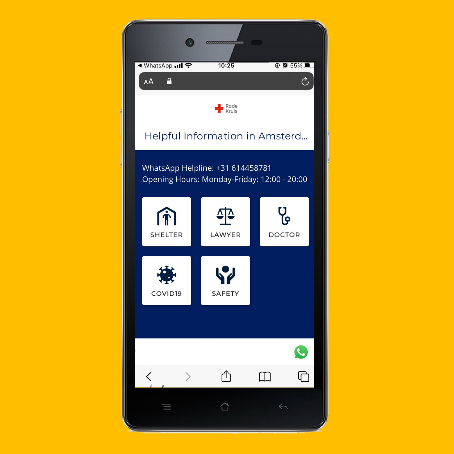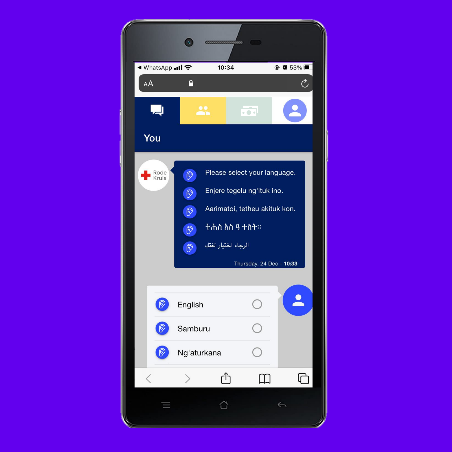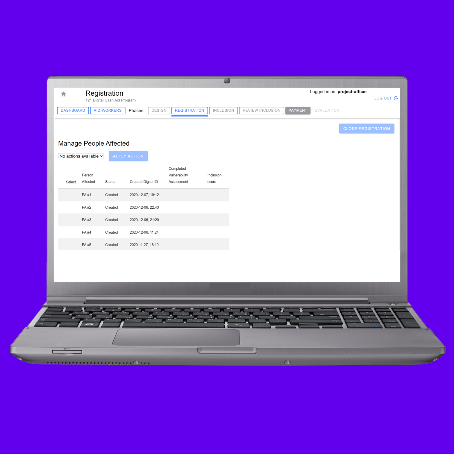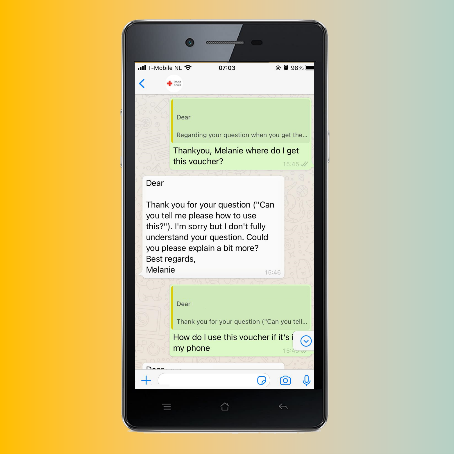Écrit par Sander Houston
Le monde connaît des niveaux records de migration et de déplacement, ce qui pose certains des défis humanitaires les plus importants des temps modernes. Partout dans le monde, les personnes qui migrent ou sont déplacées de leur domicile sont confrontées à des risques inacceptables et sont trop souvent privées des besoins fondamentaux et de la protection dont elles ont besoin pour assurer leur sécurité, leur dignité et leurs droits. Dans le monde, 70,8 millions de migrants sont involontairement déplacés. Ce défi s'applique également aux Pays-Bas. Il y a un besoin d'hébergement et un manque d'information sur les endroits où obtenir l'aide appropriée (comme l'accès à la nourriture et aux soins de santé). Le COVID représente désormais un défi supplémentaire pour ce groupe. En réponse à ce défi, la Croix-Rouge néerlandaise a créé un programme qui combine l'accès à des informations utiles et une aide en espèces.
Digital technology has the potential to transform how programs operate. Data management and digital payment platforms are already demonstrating how new technologies can have a great impact on convenience for people receiving cash assistance and also efficiencies, including for the aid organization. 121 is a platform built on the knowledge and skill of a consortium of humanitarian, technical, and academic partners across numerous locations. The 121 platform consists of three easy-to-use Cash-Based Aid products for people affected, such as undocumented migrants, and aid workers alike in response to the increasing global demand for cash and voucher-based aid in the humanitarian sector.
Ce blog présente les enseignements tirés du projet pilote 121 aux Pays-Bas, qui s'est déroulé du 1er novembre au 31 décembre.st 2020 jusqu'au 31 mai 2021
Le pilote
Anne van Berkel (Project Leader of The Netherlands Red Cross) explains how the pilot addresses both the need for information as the need for food: ‘the pilot can be divided into three pillars: Les informations utiles, Cash Aid and the WhatsApp Helpdesk. Learnings from earlier contact and co-designs with undocumented migrants pointed to the need for Cash help. This is where 121 came in’.
Le projet pilote consiste en l'envoi hebdomadaire de bons numériques en espèces via WhatsApp, le service d'assistance WhatsApp et le site Internet Helpful Information. Ces produits ont été testés à Amsterdam et à Utrecht, avec des sans-papiers qui étaient encore plus sous pression en raison de la crise du COVID. . Ce programme distribue des bons de supermarché numériques hebdomadaires (Digital Cash Vouchers) à un groupe sélectionné de sans-papiers. Ces sans-papiers font partie du Programme Alimentaire de la Croix Rouge Néerlandaise (un programme d'aide alimentaire lié à la COVID) ou sont sur la liste d'attente de la réglementation néerlandaise LVV. La réglementation LVV est un essai du gouvernement hollandais dans lequel cinq municipalités et d'autres organisations fournissent des abris et des conseils aux sans-papiers. La personne reçoit le bon de surveillance par Whatsapp et peut l'utiliser pour payer au supermarché, sans imprimer et également hors ligne. En plus des bons de caisse numériques, le projet pilote a offert des informations/références sur les abris, l'assistance médicale, les conseils légaux et le COVID pour les sans-papiers aux Pays-Bas, à travers un site web public.
L'objectif du projet pilote est de promouvoir le bien-être physique et mental des sans-papiers en réduisant l'incertitude et le stress liés à la survie quotidienne. Le projet pilote a été soutenu par la Fondation Philips qui a également été impliquée dans une phase antérieure du développement du projet 121.
Les bons et les informations utiles permettent un premier contact avec les sans-papiers. Le service d'assistance permet ensuite de poursuivre les relations avec les sans-papiers. Le retour d'information reçu par le service d'assistance peut alors être utilisé pour améliorer l'ensemble du processus en créant une boucle de retour d'information.
Someone that knows what it’s like to be an undocumented migrant for a while is John. He knows from experience how urgent the need for this innovative emergency aid is and how important it is that it is designed from the user’s perspective. That was his motivation to help as someone with practical knowledge of the issue in the creation of the Helpful Information Web App. “From the moment the Immigration and Naturalization Service rejected my asylum application, I was on the street. I went to Amsterdam, where I was able to stay reasonably under the radar of the authorities. I heard from the asylum seekers center that after a rejection you can knock on the door of a number of places for food or shelter. But where exactly, how and which? It was maddening. How can you seek help from authorities if you are just trying to hide from the authorities? I became depressed, anxious and very lonely. This aid package from the Red Cross makes a huge difference when you’re on the street. I wish others who are in temporary need that they can also increase their chances of survival via Helpful Information, the WhatsApp Helpdesk or the vouchers.”
Digital Community engagement and accountability (CEA) is an approach to Red Cross Red Crescent programming and operations. It is supported by a set of activities that help put communities at the center of what they do, by integrating communication and participation throughout the program cycle or operation. When asked what role Digital CEA plays in this pilot Jonath Lijftogt (Coordinator & Digital Community Engagement & Accountability at 510) said: ‘The pilot is a way of having direct and sustainable contact with undocumented migrants. That’s the essence of Community Engagement and Accountability’.
Application web d'informations utiles
‘There is already a lot of help available in The Netherlands but it’s not always easy to find it. The Helpful Information Web App offers a solution.’ says Van Berkel. The Helpful Information Web App is an information source for undocumented migrants with available help in the Netherlands. The Web App is available to everyone and the current information spans shelter, medical assistance, legal advice, and COVID-19. When building an app it is important to center it around the user. The Web App is a direct result of co-designing and user testing with undocumented migrants whose knowledge and experience designed this Web App. Human Centered Design methodologies and the uptake demonstrates the importance of involving the human stakeholder’s perspective in all steps of the product creation process. When Orla Canavan (Strategic Product Designer lead at 510) was asked why 510 uses Human Centered Design she said: ‘In 510 it’s easy to come up with a technical solution and assume it will work for the end user. Most all of us in this team have never experienced what it’s like to access information on a broken smartphone, with limited battery, leaning by a building to catch Wi-Fi at 8 o’clock at night just to find somewhere to sleep. These are the things we learn and adapt technology towards when we use Human Centered Design. We can’t solve everything with technology but we can at least make sure that when we do offer technology it’s at least useable.’
Pour en savoir plus sur la conception centrée sur l'humain, cliquez ici.

Application web d'informations utiles
Plate-forme 121
With the 121 platform, The Netherlands Red Cross and 510 aim to make Cash-Based Aid safe, fast, and fair, and to help people affected, by disasters (such as hurricanes, floods, drought, epidemics, and conflict) meet their own needs. 510 Co-designs with People Affected by disasters and Aid Workers and uses robust and available technology to create the solutions needed. Van Berkel adds by saying: ‘it’s a platform that allows us to easily reach and work together with vulnerable people. It optimizes the process of aid assistance by creating a feedback loop and it has the potential to adapt to different types of help’. Melanie Miltenburg (510 coordinator of the pilot) adds by saying: ‘the platform enables us to quickly scale up the number of people we support, with more or less the same capacity from our side. That’s of course a very important feature for emergency aid.’
L'application d'auto-enregistrement, le portail de l'administration centrale et le bon de caisse numérique
La plateforme 121, dans ce pilote, a deux interfaces (qui ont été construites en interne en consortium avec divers partenaires) : l'application d'auto-enregistrement et le portail des organisations humanitaires (HO). Dans l'application d'auto-enregistrement, les sans-papiers peuvent s'inscrire à des programmes. Dans le portail HO, les organisations, telles que la Croix-Rouge néerlandaise, peuvent gérer le programme depuis l'inscription jusqu'à l'envoi de paiements tels que des bons de supermarché numériques ou Mpesa. Cette plateforme peut faciliter l'enregistrement, la validation, l'inclusion et le paiement dans un programme d'argent et de bons.
L'application d'auto-enregistrement a été conçue en collaboration avec des personnes touchées par des catastrophes dans le monde entier, qui ont été interrogées sur leur expérience avant, pendant et après la réception de l'aide.
Plus d'informations ici.
Le portail HO a été conçu en collaboration avec des travailleurs humanitaires intervenant lors de ces catastrophes.
Plus d'informations ici.
Both applications were co-designed to ensure the end users’ digital knowledge and preferences were taken into account and when needed training and assistance was given.
Pour en savoir plus sur l'utilisation de l'application d'auto-enregistrement au Kenya, cliquez ici.


L'application d'auto-inscription Le portail HO
Service d'assistance WhatsApp
The WhatsApp Helpdesk is developed for People Affected to understand more about the aid they applied for, or to let us know if they face any problem with e.g. the registration process or receiving the voucher. They can also approach the Helpdesk for other topics, such as to learn where to find shelter, medical care or legal support, or even where to find a language training. The Helpdesk improves the connection with Aid Workers who can help with questions they might have. ‘The WhatsApp Helpdesk ties the program together’, says Miltenburg. She continues by saying: ‘It’s surprising, and contradicting my own initial expectations, how personal digital communication can be. From the messages we get, you can read that people feel it as a personal conversation, and let go of shame or other barriers to share their concerns. Moreover, it is the person him/herself that decides if and when to contact us, not depending on when we contact them for feedback, as in traditional projects’.
Le service d'assistance étant disponible 7 jours sur 7, il permet aux personnes concernées d'accéder rapidement et facilement à l'organisation humanitaire. En outre, les questions et les commentaires reçus par l'intermédiaire du service d'assistance donnent à l'organisation humanitaire des informations précieuses sur le contexte, les besoins et les contraintes des personnes concernées, qui peuvent être utilisées pour développer davantage les services/produits.

Service d'assistance WhatsApp
Organisations impliquées
La plateforme 121 s'appuie sur les connaissances et les compétences d'un consortium de partenaires humanitaires, techniques et universitaires répartis sur de nombreux sites.
Pour en savoir plus sur le consortium, cliquez ici.
La plateforme 121 a été pilotée aux Pays-Bas avec des sans-papiers. Il s'agit d'un groupe qui, en raison de sa situation, préfère généralement rester sous le radar et est donc souvent difficile à atteindre. Les organisations partenaires qui soutiennent spécifiquement ce groupe ont permis à la Croix-Rouge néerlandaise d'entrer en contact avec lui. La liste suivante comprend les organisations partenaires qui ont été impliquées dans ce projet pilote et qui s'étendront à l'avenir au fur et à mesure que le programme se développera : Loket Ongedocumenteerden Amsterdam (LOA), Aanmeldloket Utrecht, STIL Utrecht, Filipino LGBT Europe (Amsterdam), et Stap Verder (Amsterdam).
510’s role
510 supported The Netherlands Red Cross domestic department in providing food aid to undocumented migrants by co-designing and implementing the 121 platform. This enables undocumented migrants and other people affected to efficiently and safely register themselves to apply for food aid. The 121 platform enables sending digital vouchers through WhatsApp. It also enables aid workers and humanitarian organizations to manage and coordinate cash and voucher programs. The system, after registration, helps humanitarian organizations in making sure that the right people are part of the programs and keeps these people updated throughout the process. Lars Stevens, Project coordinator of 121 at 510, explains the benefit of this system for humanitarian organizations by saying: ‘Reducing uncertainty and creating clarity is one of the main goals for humanitarian organizations in helping people.’ These updates occur every week. The system is also able to monitor the usage of the vouchers and creating a clear overview of whether vouchers were properly received and (fully) used. The digital system allowed for the program to be scaled up a lot quicker while the capacity of the humanitarian organization stayed relatively the same. This is a huge benefit of the digital system: ‘Effectively, by a few pushes of a button people receive digital vouchers which they can use in the supermarket to buy groceries’ concludes Lars Stevens.
Principales conclusions
- L'aide offerte (bons, informations utiles, service d'assistance) permet aux personnes de réduire le stress de leur vie quotidienne grâce à une structure cohérente et à l'autonomie, ce qui contribue à une meilleure santé mentale et physique.
- Le processus numérique d'enregistrement, de réception et d'utilisation du bon est plus souple et plus pratique pour les sans-papiers, car il ne dépend pas d'un moment ou d'un lieu précis. De plus, le processus est totalement anonyme. Cela contribue au sentiment de dignité.
- La personne sait qu'elle peut trouver le service d'assistance Whatsapp lorsqu'elle a besoin d'aide ou qu'elle a une question à poser. Le service d'assistance Whatsapp est très accessible et rapide, et réduit les obstacles culturels ou pratiques qui empêchent de demander de l'aide.
- L'application Web d'informations utiles est fréquemment consultée pour savoir où s'adresser pour des besoins spécifiques, mais elle permet également à la Croix-Rouge de partager des informations en fonction des besoins à venir (par exemple, la possibilité de vacciner les sans-papiers avec le COVID) : L'opportunité de vaccination COVID pour les sans-papiers a été mise à jour quotidiennement sur ce site.
- L'utilisation de l'aide numérique a permis à la Croix-Rouge néerlandaise de développer rapidement le programme en fonction des nouveaux besoins.
Comment nous mesurons les principaux résultats
We measured the main findings both in an quantitative and qualitative way. From a quantitative point we collected data through the registration system, Helpful Information App (clicks), and Helpdesk (log sheet). For qualitative measurements we elicited feedback from undocumented migrants in the program by sending them an online survey and by conducting interviews . We also conducted interviews with the partner organizations involved . ‘Relevant information about individuals and communities in need can help provide effective and personalized humanitarian aid.’ says Joachim Ramakers (Policy Advisor Data Responsibility at 510). He continues by saying: ‘Our data responsibility policy addresses the responsible processing of data concerning ethical standards and in principles in the humanitarian context, bearing in mind potential consequences and taking measures to avoid putting individuals or communities at risk.’
Pour en savoir plus sur notre politique de responsabilité en matière de données, cliquez ici.
Prochaines étapes
La prochaine phase du programme comprendra l'élaboration d'un plan d'action incluant la planification, un budget détaillé et les étapes de la collecte de fonds. Un transfert progressif comprendra la formation et la rédaction de manuels. Le programme 121 est actuellement lancé officiellement aux Pays-Bas.
Pour en savoir plus sur les derniers projets de l'agence 121 et sur les pilotes du monde entier qui y sont associés, cliquez ici.

Parcours simplifié de l'utilisateur